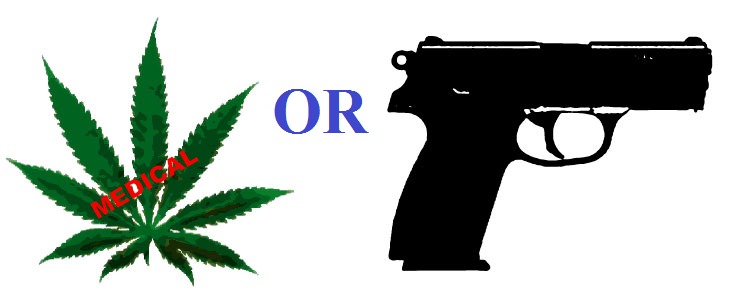Unless you have been living under a rock, anyone who pays attention to the news can see that “medical marijuana” (technically called medical cannabis) in Pennsylvania is coming. Although there are very heated debates on the merits of it all, those debates are necessary and good, but they are best reserved for another internet blog elsewhere.
Here at Pennsylvania Law Abiding Gun Owner (PennLAGO) blog, we concentrate on the facts and the law as well as its application to firearm’s rights.

What is the current status of the proposed legislation?
The Pennsylvania Senate passed SB 3 in 2015. The Pennsylvania House first approved amendments and then the bill as amended this year. If the Senate agrees with the amendments, the bill will go to Governor Tom Wolf, who has agreed to sign it.
What does the proposed legislation allow?

The current iteration of the proposed legislation will not initially allow smoked botanical forms of cannabinoids. It will initially only allow for ingesting by pills, oils, gels, creams, ointments, tinctures, liquid, and non-whole plant forms for administration through vaporization. Dispensaries could not sell edibles, but medical cannabis products could be mixed into food or drinks to facilitate ingestion by a patient in a facility or residence. Vaporization is allowed, and smoking is prohibited. Later, following the issuance of the board’s report, the Department of Health could promulgate a rule that would allow patient access to dry leaf cannabis. But that is somewhere down the road, it is likely.
[In an act of pure speculation, we suggest that Pennsylvania will not be unique in that like most states that have allowed for some form of legalized cannabis use, it is likely that recreational use of cannabis will follow (especially given the fiscal benefits of taxing it).]
This proposed legislation is far from the rather loose medical marijuana scheme in California. It has specific conditions that qualify for issuance of a Pennsylvania medical cannabis registration card. One must have a certified terminal illness or suffer from cancer, HIV/AIDS, amyotrophic lateral sclerosis, Parkinson’s disease, multiple sclerosis, epilepsy, inflammatory bowel disease, neuropathies, Huntington’s disease, Crohn’s disease, post-traumatic stress disorder, intractable seizures, glaucoma, autism, sickle cell anemia, damage to the nervous tissue of the spinal cord with objective neurological indication of intractable spasticity, and severe chronic or intractable pain of neuropathic origin, or if conventional therapeutic intervention and opiate therapy is contraindicated or ineffective.
Nothing in the bill will allow those who had any of the above conditions to petition the court to set aside past convictions.
So what is the problem? Why should PennLAGOs care? Why should PennLAGOs pause before seeking a medical cannabis registration card in Pennsylvania?
While nothing in this blog post is meant to discourage or encourage those who, once the law is signed and in effect, qualify for a Pennsylvania medical cannabis registration card to obtain a medical cannabis card, a PennLAGO who wishes to own, possess or use a firearm (defined as long guns, handguns or NFA items), needs to be aware of a 2011 ATF open letter to all FFLs before you apply or act. The guidance letter was issued in response to the ground swell of states that were moving to medicinal and/or recreational marijuana.
Background
As those who have filled out a AFT 4473 will recall, there is this question 11(e) on the form…
![]()
Many Pennsylvania FFLs and PennLAGOs haven’t given this question much thought as up until now the idea of legalized marijuana possession or use has been a pipe dream. While some people and FFLS have latched on to the phrase “unlawful user” and have argued that if medical cannabis is implemented in Pennsylvania and if an applicant filling out a 4473 has a would be a “lawful user.” Such thinking is ill-advised.
Here is why: September 21 2011 OPEN LETTER TO ALL FEDERAL FIREARMS LICENSEES
It is a short letter (less than one full page), but it is now something that PennLAGOs must be aware of in the context of medical marijuana and the Second Amendment.
As you know, Federal law, 18 U.S.C. § 922(g)(3), prohibits any person who is an “‘unlawful user of or addicted to any controlled substance (as defined in section 102 of the Controlled Substances Act (21 U.S.C. 802))” from shipping, transporting, receiving or possessing firearms or ammunition. Marijuana is listed in the Controlled Substances Act as a Schedule I controlled substance, and there are no exceptions in Federal law for marijuana purportedly used for medicinal purposes, even if such use is sanctioned by State law. Further, Federal law, 18 U.S.C. § 922(d)(3), makes it unlawful for any person to sell or otherwise dispose of any firearm or ammunition to any person knowing or having reasonable cause to believe that such person is an unlawful user of or addicted to a controlled substance. As provided by 27 C.F.R. § 478.11, ”an inference of current use may be drawn from evidence of a recent use or possession of a controlled substance or a pattern of use or possession that reasonably covers the present time.”
Therefore, any person who uses or is addicted to marijuana, regardless of whether his or her State has passed legislation authorizing marijuana use for medicinal purposes, is an unlawful user of or addicted to a controlled substance, and is prohibited by Federal law from possessing firearms or ammunition. Such persons should answer “yes” to question 11.e. on ATF Form 4473 (August 2008), Firearms Transaction Record, and you may not transfer firearms or ammunition to them. Further, if you are aware that the potential transferee is in possession of a card authorizing the possession and use of marijuana under State law, then you have “reasonable cause to believe” that the person is an unlawful user of a controlled substance. As such, you may not transfer firearms or ammunition to the person, even if the person answered “no” to question 11.e. on ATF Form 4473.
So it seems that applying for and receiving that Pennsylvania medical cannabis registration card and gun possession, use and transfer are incongruent.
How would the Pennsylvania Instant Check (PICS) or the FFL find out about it?
Good question. At present according to sources at the Pennsylvania State Police (PSP), which administers PICS, there are no plans or mechanisms for them to capture and maintain as part of PICS whether or not someone has a Pennsylvania medical cannabis registration card. Is it possible that somewhere in the rule-making process that PSP will create or maintain a Pennsylvania medical cannabis registration card database? Is it possible that somewhere in the rule-making process that Pennsylvania Department of Health (PADOH) will create or maintain a Pennsylvania medical cannabis registration card database and will grant access to PSP? Is it possible that somewhere in the rule-making process that if PSP gains access to a PADOH or self made registration of Pennsylvania medical cannabis registration card will they link it to PICS? Perhaps people are thinking on this level. Perhaps not. These are important questions that need answers. No one wants to become a criminal accidentally.
In addition to big brother and a database, there are other ways that one can conceivably foresee that it becomes known that an applicant filling out a 4473 or someone how owns, uses, or possess has a Pennsylvania medical cannabis registration card. Someone could try to present a Pennsylvania medical cannabis registration card as a form of identification for purposes of verifying identity for the 4473 purposes. At a traffic stop, a LTCF holder could present the LTCF and the Pennsylvania medical cannabis registration card at the traffic stop which then a properly trained officer or trooper could investigate this. The 4473 applicant could pause at that question and announce that they have a Pennsylvania medical cannabis registration card at the time of 4473 application. Someone could know that you have a Pennsylvania medical cannabis registration card and report your possession, use or transfer of a firearm.
What is the potential penalty for a Pennsylvania FFL who ignores this guidance?
In the pressure for profits and in the very competitive marketplace of firearms sales, it is very tempting for Federal Firearms Licensees (FFLs) to “not hear” or “not see” something that would disqualify someone from a firearm purchase. But no one sale or even hundreds of sales are worth your FFL or your liberty.
From a regulatory point of view, it can yield a Report of Violations (ROV) from BAFTE Industry Operations (IO) department at the time of an audit. If it is found to willful, then the revocation process that can yield revocation, suspension, fining or a conference.
If it is referred to the Criminal Enforcement (CE) side of the BAFTE, then you could potentially face a federal charge of Knowing sale to prohibited person under 18 U.S.C. § 922(d) which has a ten year maximum sentence. The federal sentencing guidelines give a base offense level of 12. And given that an FFL is going to have no prior criminal record (or a very minimal one), they will likely find themselves in Category I for prior record, a conviction of this crime calls for a federal sentence of 10-16 months without any enhancements or mitigating events. Plus, this type of conviction would prohibit you from using, possessing or transferring a firearm for life.
Conclusion
Pennsylvania is posed to be the 24th state in the United States to allow some form of legalized cannabis use. PennLAGOs and Pennsylvania FFL holders have not really had to think much about this in the past. But a PennLAGO and a Pennsylvania FFL need to start thinking about these things so as to not turn themselves into an accidental criminal.
